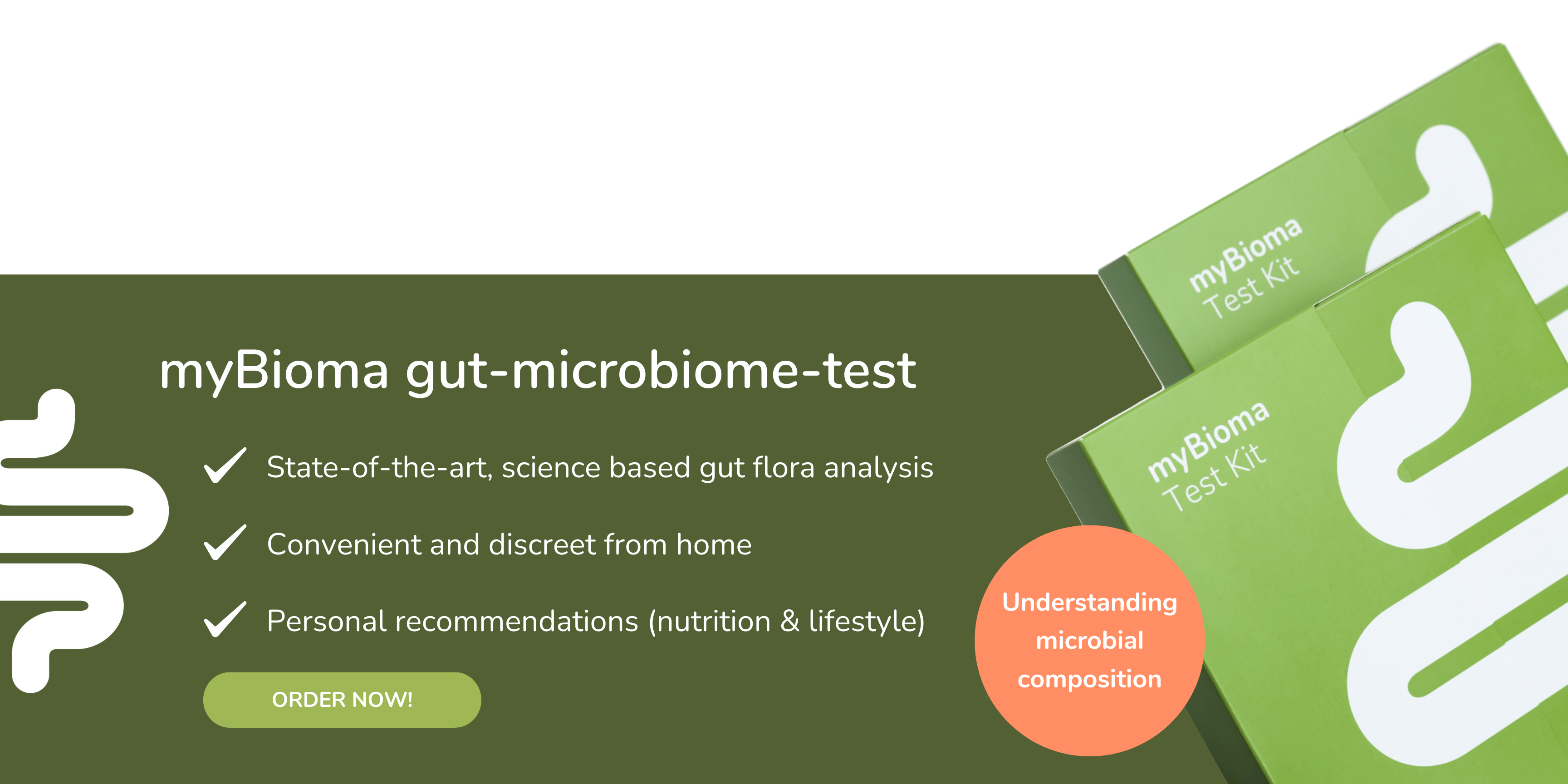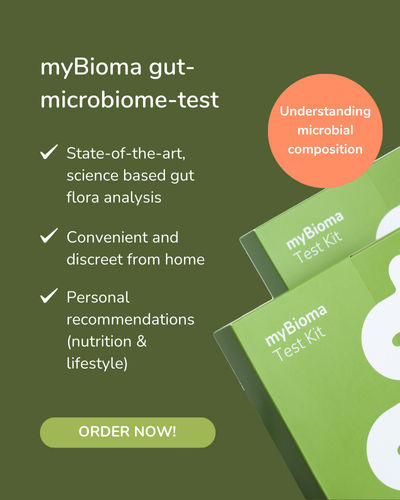Table of contents
- Your gut may determine the quality of your sleep
- The gut microbiome influences the sleep-wake cycle
- How important is sleep for the gut?
- The gut microbiome influences the hormones responsible for sleep
- A deeper look into the science of the microbiome and sleep
- Diet influences the gut microbiome
- Studies of sleep and the microbiome in humans
- The negative effects of disturbed sleep
- What helps to positively influence the microbiome and sleep?
Your gut may determine the quality of your sleep
We spend about a third of our lives asleep. Sleep is vital - it is just as important to our bodies as eating, drinking and breathing. Sufficient sleep is essential for maintaining good mental and physical health. Sleep and relaxation is the body's opportunity to recharge and reenergize. We probably all know the feeling when we haven't slept enough, we are tired, sluggish and somehow not fully present. The gut microbiome - the collection of trillions of microorganisms that live in your gut - not only has a huge impact on your overall health, but may also determine how well you sleep. Let's take a closer look at the connection between the gut microbiome and sleep, as well as current research.
The gut microbiome influences the sleep-wake cycle
The microbial ecosystem can influence sleep and sleep-related physiological functions in several ways, including altering the body's sleep-wake cycle and influencing the hormones that regulate sleep and wakefulness. In turn, the quality of our sleep can affect the health and diversity of our microbiome. (1)
There is a constant interaction between the gut and the brain , which means that a disruption in either can affect sleep.
But can sleep disorders also come from the gut? The answer is yes! The microbiome actually promotes the release of many of the neurotransmitters - including dopamine, serotonin and GABA - that help regulate mood and promote sleep. Studies show a strong link between microbiome imbalance and stress, anxiety and depression, which in turn can trigger or exacerbate sleep disorders. (2, 3) Research also links gut health to pain perception. An unhealthy microbiome appears to increase sensitivity to visceral pain, which can then make it much more difficult to fall asleep and stay asleep. (4)
How important is sleep for the gut?
Just as dysbiosis (imbalance of gut bacteria) can affect sleep, unhealthy sleep patterns can disrupt the gut microbiome. This is the case, for example, with the common sleep disorder, obstructive sleep apnoea. This causes shallow breathing and breathing interruptions during sleep. People with obstructive sleep apnoea also snore very frequently. In one study, scientists subjected mice to a pattern of disturbed breathing that mimicked the effects of obstructive sleep apnea. They found that the mice, which lived with periods of OSA-like breathing for six weeks, showed significant changes in the diversity and composition of their microbiome. (5)
In addition, insufficient sleep duration can promote inflammatory reactions in the body and increase inflammatory markers in the gut, as well as releasing more stress hormones in the body. All of this can have a negative impact on your gut health. (6)
But how does the gut work during sleep? The gut also needs periods of rest in order to work optimally. During sleep, especially in the deep sleep phases, intestinal movement is reduced as the body focusses on regeneration processes. Among other things, this leads to a recovery of the intestinal cells, cell repair is supported and the gut is strengthened as a result. (7), (8)
The gut microbiome influences the hormones responsible for sleep
Gut health is also significantly linked to hormones that influence sleep. Melatonin, the "darkness hormone", is essential for sleep and a healthy sleep-wake cycle.Melatonin is produced in both the gut and the brain, and there is evidence that melatonin in the gut may operate on a different cyclical rhythm than melatonin produced in the brain by the pineal gland.(9)
In addition, cortisol is crucial for the sleep-wake cycle. (10) This hormone is central to the body's stress and inflammatory response and affects gut permeability and microbial diversity. Rising cortisol levels very early in the day help to promote alertness, concentration and energy. Changes in cortisol that occur within the gut-brain axis are very likely to have an impact on sleep.(11)
Simply, our gut affects how well we sleep, and sleep affects the health of our gut. By addressing both, we can vastly improve the quality of our sleep. With myBioma , you can easily find out if your gut microbiome is in balance and optimize your gut health with appropriate dietary recommendations.
A deeper look into the science of the microbiome and sleep
A growing number of studies now suggest that the vast and diverse microbial ecosystem of the gut has its own circadian rhythms. These microbial rhythms appear to be deeply intertwined with circadian rhythms. (12)
A circadian rhythm refers, for example, to fluctuations in bodily functions that are controlled by exogenous (day-night changes) or endogenous (hormones) influences. Examples include fluctuations in heart rate, the sleep-wake rhythm, blood pressure and body temperature.
Research suggests that both circadian and microbial rhythms are capable of influencing and disrupting the other, with consequences for both health and sleep. (13)
Diet influences the gut microbiome
According to research, the rhythms of gut bacteria are influenced by what and when we eat. A study in mice found that when mice ate a healthy diet, they produced more beneficial bacteria and that the collective activity of microbial life in the gut followed a daily - or diurnal - rhythm. (14, 15)
This rhythm, in turn, supported the animal's circadian rhythms.In contrast, mice fed a high-fat, "Western" diet produced less optimal microbial life. The bacteria in these mice did not adhere to a daily rhythm themselves and also sent out signals that disrupted the circadian rhythm. These mice gained weight and became obese, while the mice that ate a healthy diet did not.

A healthy diet supports the good gut bacteria.
Scientists bred a third group of mice without a microbiome. Because they lacked a gut microbiome, there were no bacteria to send signals to the rest of their bodies. Circadian disruption occurred in these mice, but they did not gain weight or suffer from metabolic disorders, even when fed the high-fat diet. This suggests some important conclusions. First, that microbial activity is key to normal circadian function and therefore sleep.Second, that the microbiome, along with diet, plays a key role in regulating weight and metabolism.
Studies of sleep and the microbiome in humans
Research on humans has produced similar results. The human microbiome appears to follow daily rhythms that are influenced by the timing of eating and the type of food consumed, and it appears to exert effects on circadian rhythms. Research has also found that the relationship between these different biological rhythms works both ways. Scientists found that disruptions to circadian rhythms - the kind that occur from jet lag, whether from actual travel or from "social" jet lag - disrupt microbial rhythms and the health of the microbial ecosystem.(16) According to research, people who experience these changes in microbial rhythms as a result of circadian disruption suffer from metabolic imbalance, glucose intolerance and weight gain.(17)
The negative effects of disturbed sleep
We have known for some time about the relationship between sleep, circadian rhythms and metabolic health. Disrupted sleep and misaligned circadian rhythms are closely linked to higher rates of obesity and metabolic disorders including type 2 diabetes. This new knowledge of the microbiome and its relationship to circadian function may, in time, provide us with a deeper understanding of how health is affected by sleep and circadian activity.(18)
What helps to positively influence the microbiome and sleep?
Although science continues to investigate the complex interactions between the gut microbiome and sleep, the full implications of this relationship are not yet fully understood. What is certain is that the health of our gut affects our overall wellbeing. By starting to positively influence the ecosystem of your microbiome, you are taking a preventative measure to avoid discomfort. Whatever your sleep routine looks like, there are ways you can support your sleep and your gut.
Start by positively supporting your microbiome, find out your status quo and get a complete gut check to improve your overall wellbeing. Start your individual microbiome analysis now!
References
- Schwartz, J.R.L. and Roth, T. (2008). Neurophysiology of sleep and wakefulness: basic science and clinical implications. Current Neuropharmacology. 6:4, pp. 367-378. doi: 10.2174/157015908787386050
- Martin CR, Osadchiy V, Kalani A, Mayer EA. The Brain-Gut-Microbiome Axis. Cell Mol Gastroenterol Hepatol. 2018;6(2):133-148. Published 2018 Apr 12. doi:10.1016/j.jcmgh.2018.04.003
- IY Chen, DC Jarrin, H Ivers, A Rochefort, CM Morin, 0291 ASSOCIATION BETWEEN STRESS-INDUCED AROUSAL AND NOCTURNAL SLEEP, Sleep, Volume 40, Issue suppl_1, 28 April 2017, Pages A107–A108, https://doi.org/10.1093/sleepj/zsx050.290
- Chichlowski M, Rudolph C. Visceral pain and gastrointestinal microbiome. J Neurogastroenterol Motil. 2015;21(2):172-181. doi:10.5056/jnm15025
- Moreno-Indias I, Torres M, Montserrat JM, Sanchez-Alcoholado L, Cardona F, Tinahones FJ, Gozal D, Poroyko VA, Navajas D, Queipo-Ortuño MI, Farré R. Intermittent hypoxia alters gut microbiota diversity in a mouse model of sleep apnoea. Eur Respir J. 2015 Apr;45(4):1055-65. doi: 10.1183/09031936.00184314. Epub 2014 Dec 23. PMID: 25537565.
- Irwin, M. R., et al. (2015). Sleep Health: Reciprocal Regulation of Sleep and Innate Immunity. Brain, Behavior, and Immunity, 47, 201-217
- Dinning, P. G., & Hunt, L. (2013). Sleep and the gut. Neurogastroenterology & Motility, 25(9), 721-724.
- Prendergast, B. J., et al. (2003). Sleep deprivation decreases intestinal epithelial cell proliferation in rats. Journal of Pineal Research, 35(1), 41-48.
- Mukherjee S, Maitra SK. Gut Melatonin in Vertebrates: Chronobiology and Physiology. Front Endocrinol (Lausanne). 2015 Jul 22;6:112. doi: 10.3389/fendo.2015.00112. PMID: 26257705; PMCID: PMC4510419.
- https://www.naturalmedicinejournal.com/journal/2010-06/role-cortisol-sleep
- Foster JA, Rinaman L, Cryan JF. Stress & the gut-brain axis: Regulation by the microbiome. Neurobiol Stress. 2017 Mar 19;7:124-136. doi: 10.1016/j.ynstr.2017.03.001. PMID: 29276734; PMCID: PMC5736941.
- Gutierrez Lopez DE, Lashinger LM, Weinstock GM, Bray MS. Circadian rhythms and the gut microbiome synchronize the host’s metabolic response to diet. Cell Metab. 2021 May 4;33(5):873-887. doi: 10.1016/j.cmet.2021.03.015. Epub 2021 Mar 30. PMID: 33789092.
- https://www.the-scientist.com/daily-news/gut-microbes-influence-circadian-clock-35619
- https://www.sciencedaily.com/releases/2016/12/161201121135.htm
- Roberto Refinetti (2017) Western diet affects the murine circadian system possibly through the gastrointestinal microbiota, Biological Rhythm Research, 48:2, 287-296, DOI: 10.1080/09291016.2016.1254873
- Deaver JA, Eum SY, Toborek M. Circadian Disruption Changes Gut Microbiome Taxa and Functional Gene Composition. Front Microbiol. 2018 Apr 13;9:737. doi: 10.3389/fmicb.2018.00737. PMID: 29706947; PMCID: PMC5909328.
- Shu-Qun Shi, Tasneem S. Ansari, Owen P. Mcguinness, David H. Wasserman, Carl Hirschie Johnson. Circadian Disruption Leads to Insulin Resistance and Obesity. Current Biology, 21 February 2013 DOI: 10.1016/j.cub.2013.01.048
- Bailey SM, Udoh US, Young ME. Circadian regulation of metabolism. J Endocrinol. 2014 Aug;222(2):R75-96. doi: 10.1530/JOE-14-0200. Epub 2014 Jun 13. PMID: 24928941; PMCID: PMC4109003.










